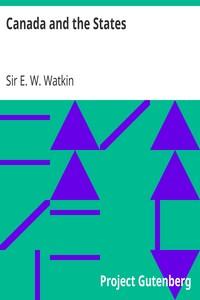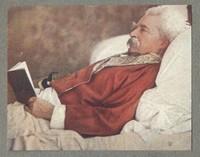Read this ebook for free! No credit card needed, absolutely nothing to pay.
Words: 150282 in 30 pages
This is an ebook sharing website. You can read the uploaded ebooks for free here. No credit cards needed, nothing to pay. If you want to own a digital copy of the ebook, or want to read offline with your favorite ebook-reader, then you can choose to buy and download the ebook.


: Canada and the States by Watkin E W Edward William Sir - United States Description and travel; Canada Description and travel; Canada History
A quarter of a century ago, charged with the temporary oversight of the then great Railway of Canada, I first made the acquaintance of Mr. Tilley, Prime Minister of the Province of New Brunswick, whom I met in a plain little room, more plainly furnished, at Frederickton, in New Brunswick. My business was to ask his co-operation in carrying out the physical union of Nova Scotia, New Brunswick, and through them Prince Edward Island and Newfoundland, with Canada by means of what has since been called the "Intercolonial" Railway. That Railway, projected half a century ago, was part of the great scheme of 1851,--of which the Grand Trunk system from Portland, on the Atlantic, to Richmond; and from Riviere du Loup, by Quebec and Richmond, to Montreal, and then on to Kingston, Toronto, Sarnia, and Detroit--had been completed and opened when I, thus, visited Canada, as Commissioner, in the autumn of 1861. I found Mr. Tilley fully alive to the initial importance of the construction of this arterial Railway--initial, in the sense that, without it, discussions in reference to the fiscal, or the political, federation, or the absolute union, under one Parliament, of all the Provinces was vain. I found, also, that Mr. Tilley had, ardently, embraced the great idea--to be realized some day, distant though that day might be--of a great British nation, planted, for ever, under the Crown, and extending from the Atlantic to the Pacific.
Certainly, in 1861, this great idea seemed like a mere dream of the uncertain future. Blocked by wide stretches of half-explored country: dependent upon approaches through United States' territory: each Province enforcing its separate, and differing, tariffs, the one against the other, and others, through its separate Custom House; it was not matter of surprise to find a growing gravitation towards the United States, based, alike, on augmenting trade and augmenting prejudices.
Amongst party politicians at home, there was, at this time, of 1861, little adhesion to the idea of a Colonial Empire; and the reader has only to read the reference, made later on, to a published letter of Sir Charles Adderley to Mr. Disraeli in 1862, to see how the pulse of some of the Conservative party was then beating.
There was, however, one bright gleam of hope. That was to be found in the, still remembered, effects of the visit of the Prince of Wales, accompanied by the Duke of Newcastle, to Canada, and the United States, in 1860.
Entertaining, with no small enthusiasm, and in common, these views of an Anglo-American Empire, Mr. Tilley and I were of the same opinion as to practical modes. We must go "step by step," and the Intercolonial Railway was the first step in the march before us.
In the following pages will be found some record of what followed. Suffice it here to say, that the Railway is made, not on the route I advocated: but it is in course of improvement, so that the shortest iron road from the great harbour of Halifax, in Nova Scotia, to the Pacific may be secured. The vast western country, bigger than Russia in Europe, more or less possessed and ruled over, since the days of Prince Rupert, the first governor, by the "Merchant Adventurers of England trading to Hudson's Bay," has been annexed to Canada, and one country, under one Parliament, is bounded by the two great oceans; and, as a consequence, the "Canadian Pacific Railway" has been made and opened for the commerce of the world.
Mr. Tilley, now Sir Leonard Tilley, is, at the moment, Lieutenant- Governor of New Brunswick, having previously filled the highest offices in the Government of the "Dominion of Canada;" and he has not forgotten the vow he and I exchanged some while after our first acquaintance. That vow was, that we neither of us would die, if we could help it, "until we had looked upon the waters of the Pacific from the windows of a British railway carriage." The Canadian Pacific Railway is completed, completed by the indomitable perseverance of Sir George Stephen, Mr. Van Horne, and their colleagues--sustained as they have been, throughout, by the far-sighted policy and liberal subsidies, granted ungrudgingly, by the Dominion Parliament, under the advice of Sir John A. Macdonald, the Premier. I have, in the past year, fulfilled my vow, by traversing the Canadian Continent from Quebec to Port Moody, Vancouver City, and Victoria, Vancouver's Island, over the 3,100 miles of Railway possessed by the Canadian Pacific Company, and have "looked upon the waters of the Pacific from the windows of a British railway carriage."
My impressions of this grand work will be found in future chapters.
"The Dominion of Canada" now includes the various Provinces of North America, formerly known as Upper and Lower Canada, New Brunswick, Nova Scotia, Prince Edward Island, British Columbia, Vancouver's Island, and the extensive regions of The Hudson's Bay Company, including the new Province of Manitoba, and the North West Territories; in fact, the whole of British North America, except Newfoundland.
This territory stretches from the Atlantic to the Pacific Ocean, and is estimated to contain a total area of some four million square miles.
As matter of mere surface, and probably of cultivable area, also, more than half the Northern Continent of America owes allegiance to the Crown and to Queen Victoria. So may it remain. So it will remain if we retain the Imperial instinct. These noble provinces are confederated into a vast dominion, with one common Law, one Custom House, and one "House of Commons"--by a simple Act of the Imperial Parliament, the Confederation Act of 1867, passed while Lord Beaconsfield was Prime Minister and the Duke of Buckingham Colonial Minister. This union was effected quietly, unostentatiously, and in peace; and by the exertions, influence, and faithfulness to Imperial traditions, of Cartier, John A. Macdonald, John Ross, Howe, Tilley, Galt, Tupper, Van Koughnet, and other provincial statesmen, who forced the Home Government to action and fired their brother colonists with their own enthusiasm.
At home, all honour is due to a great Colonial Minister--the Duke of Newcastle.
Free books android app tbrJar TBR JAR Read Free books online gutenberg
More posts by @FreeBooks

: Mark Twain by Henderson Archibald Coburn Alvin Langdon Photographer - Twain Mark 1835-1910; Authors American 19th century Biography


: The Battle Ground by Glasgow Ellen Anderson Gholson - Historical fiction; United States History Civil War 1861-1865 Fiction; Southern States History Fiction






